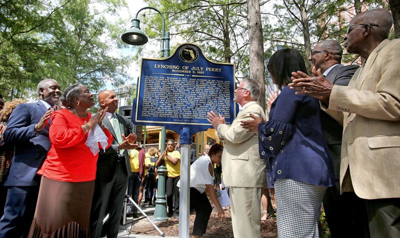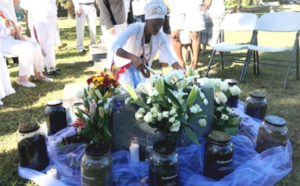

A bill introduced by Democratic state Sen. Randolph Bracy would split $10 million among descendants of victims of the Ocoee massacre.
The bloody Election Day fray in 1920 led to a lynching and the exodus of virtually every Black resident in the west Orange community for more than half a century.
“It’s time, long past time” for compensation, said Bracy, whose district is headquartered in Ocoee, about 12 miles west of Orlando.
The reparations bill requires research by the Office of Program Policy Analysis & Government Accountability, now underway.
The analysis by the Legislature’s investigative arm was directed by state Senate President Bill Galvano to identify “direct descendants of individuals killed, injured or otherwise victimized by the violence at Ocoee” — people who would likely be recipients of taxpayer money if lawmakers pass the bill and Gov. Ron DeSantis signs it into law.
Often politically divisive, the issue of reparations for African Americans has been thrust recently into the national spotlight.

An Episcopal seminary in Virginia announced this month it will create a $1.7 million reparations fund to make up for its reliance on slave labor in in the 19th century.
Democratic presidential candidates have fielded questions during televised debates about their views on compensating descendants of former slaves.
In April, students at Georgetown University voted to create a reparations fund to pay descendants of the 272 slaves once owned by the Jesuit-affiliated school.
And in June, a congressional subcommittee held a hearing on a bill that would commission a study on reparations for harm caused by slavery and its legacy.
The hearing was held on Juneteenth, the date of the oldest nationally celebrated commemoration of the ending of slavery in the U.S.
Before the hearing, Senate Majority Leader Mitch McConnell, a Kentucky Republican, rejected reparations for slavery, saying it would be hard to know whom to pay.
“I don’t think reparations for something that happened 150 years ago, for whom none of us currently living are responsible, is a good idea,” he said, according to media reports.
State Rep. Anthony Sabatini, a Lake County Republican, said he would keep an open mind and read the report on Bracy’s bill before forming an opinion.
“Generally, I’m against reparations,” he said. “You can’t correct for all of history’s wrongs…We should be focused on the present and the future, not the past.”
Although Bracy recognizes the Ocoee bill will face opposition, he said the chances of it passing now are better than ever before.
“I think there’s a reckoning happening in this country,” said Bracy, hopeful fellow Florida lawmakers will back the bill.
He cited the planting of a historical marker in downtown Orlando in June acknowledging the massacre and the Nov. 3, 1920, lynching of Julius “July” Perry, the first physical memorial to the tragedy, sometimes called the Ocoee riot. The ceremony featured the mayors of Orange County and Orlando and was attended by Rusty Johnson, Ocoee’s mayor.
Ocoee, which elected a Black candidate to the City Commission for the first time ever in 2018, is planning a centennial observance of the Jim Crow-era tragedy next year.
Perry, a well-to-do African American landowner, was wounded and captured by an armed white mob that stormed his home the evening of Nov. 2, 1920.
The deputized mob was searching for Mose Norman, an associate of Perry’s who had inflamed poll workers in Jim Crow-era Orange County by trying to vote.
Perry and Norman also had led voter-registration drives encouraging Blacks — and women — to vote in the election 99 years ago, the first in which women could participate.
Perry was dragged from Orlando his jail cell sometime after midnight and hanged.
The death toll from the massacre is officially unknown but ranges from a half-dozen Blacks to more than 50.
Walter White, a civil rights activist who investigated lynching’s for the NAACP, alleged that he spoke with a white man who claimed to have killed 17 blacks himself.
Two whites also died in an exchange of gunfire. Both men, Leo Bogard and Elmer McDaniel, reportedly were fatally wounded trying to force their way into Perry’s home.
About 100 Black residents owned land before the violence. None afterward.
Blacks who survived the onslaught — which burned homes, two churches and a meeting hall to the ground — abandoned their land and fled in fear.
After the lynching, Perry’s estate and 330 other acres of land were taken from Black families living in the Ocoee area, said Orlando attorney Melissa Fussell, who researched the massacre for a 2016 law review paper entitled, “Dead Men Bring No Claims.” The paper suggested a possible alternative for descendants of victims seeking compensation.
In an interview with the Orlando Sentinel, she said Office of Program Policy Analysis & Government Accountability investigators have interviewed her about the detailed and foot-noted research paper.
Fussell said local government leaders and law enforcement did nothing to halt the violence or theft of property but instead were complicit.
“Many blamed the Ocoee riot on Ku Klux Klan ‘outsiders’ but it was — and is — widely accepted that as much as 90 percent of the Orange County Klan worked for the government at the time,” she wrote in the paper.
Perry’s great-grandniece Gladys Franks Bell, 80, said she was hopeful Bracy’s bill would get a fair hearing and families finally would be compensated.
“Yes, it’s time,” she said. “If not now, when?”


Be the first to comment